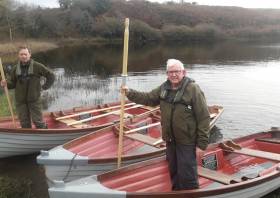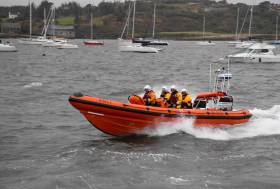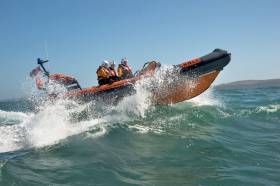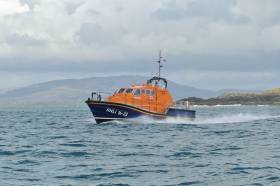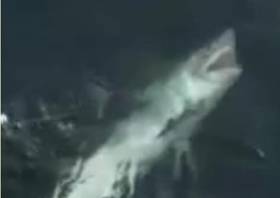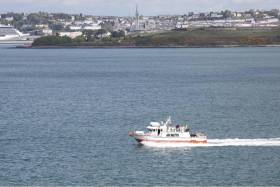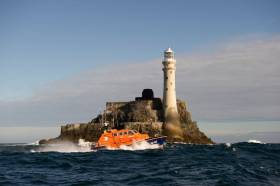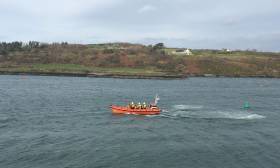Displaying items by tag: west cork
Optimist Spring Training Dates Set For 2020 In Baltimore
16-21 February are the dates to save for Optimist Spring Training at Baltimore Sailing Club in West Cork.
This year the class has teamed up with freelance dinghy performance coach Thomas Chaix to work collaboratively on training sessions to kick off the season — riding high on the international success of Oppy helms like Rocco Wright.
And at the end of the week the assembled Optimist sailors have their pre-trials regatta.
On the social side, IODAI has organised a movie night at Casey’s Hotel and an end-of-week disco with the opportunity for parents to relax and meet up for a meal.
Registration for 2020 Spring Training is now available online. For more details contact Mandy at [email protected] see the IODAI website.
Shepperton Lakes in West Cork will now be eco-friendly following the introduction of measures to reduce the carbon footprint of anglers fishing the popular Shepperton (Shreelane) fishery.
Inland Fisheries Ireland (IFI) is introducing regulations which will only permit battery-powered engines on the lake from 1 January 2020.
As part of the eco-friendly measures, Inland Fisheries Ireland is removing its four petrol engines from use at Shepperton, between Leap and Skibbereen.
Anglers can now hire one of the recently refurbished boats and bring their own battery-powered engines.
This follows similar measures introduced at Ballinlough, north of Leap, which has operated successfully for a number of years.
The boat hire at Shepperton Lakes, including a one-day fishing permit for up to two anglers, will cost €30.
‘…a popular winter pike angling destination attracting local and visiting anglers to the area’
Sean Long, director of the South Western River Basin District, said: “This initiative was proposed by the local Inland Fisheries Ireland ‘Green Team’ as a quick and simple measure to reduce carbon emissions.
“We are pleased to offer this green solution to anglers at the lake while also maintaining the permit price once again this year.”
IFI’s Green Team comprises staff in various locations across the country and is part of the organisation’s efforts to refocus its philosophy in line with the critical nature of climate change and the impact it is having on the fisheries resource.
The Green Team works to create solutions which will help achieve an energy reduction target of 33% by 2020 and devise solutions which will support society in reducing its environmental footprint.
Shepperton/Shreelane Lakes in West Cork represent a popular winter pike angling destination attracting local and visiting anglers to the area.
As shore angling is not permitted, anglers are advised to book a boat locally from Mrs E Connolly via telephone 028 33328 in advance to avoid disappointment.
Busy Weekend For West Cork Lifeboats In Baltimore & Courtmacsherry
Following last Thursday’s launch to a sailing dinghy aground on an island near Baltimore Harbour, the local RNLI crew were called out twice on Sunday (22 September), with the first to other boat aground in the harbour.
The inshore lifeboat was on scene in a matter of minutes after they were notified that the 14m sailing boat had run up on rocks at the harbour’s edge.
Volunteer crew set up a tow line to return the vessel to deeper water and, once it was checked over for damage, the lifeboat towed the yacht head to wind to let its crew set their sails.
Baltimore’s inshore lifeboat launched again at 3.36pm to assist a RIB with five people on board which broke down and was at anchor off Castle Point, near Schull Harbour.
However, while en route the lifeboat was stood down after word came through that the RIB’s occupants had managed to get themselves under way.
Elsewhere, in West Cork, Courtmacsherry’s all-weather lifeboat launched on Saturday evening (21 September) as bad weather unfolded to rescue a surfer in difficulty off Inchydoney.
As the lifeboat was speeding across Clonakilty Bay to the reported location, its crew were informed that the surfer had managed to get ashore safe and well.
Deputy launching authority Diarmuid O’Mahony praised those on shore who called for help for their quick alert: “Vital minutes today could have been so important in sea conditions that were very poor.
“I also want to commend all the volunteer crew who responded so quickly in coming to the lifeboat station in the knowledge that they were going to face some mountainous seas and difficult conditions off the coast.”
As previously reported, Crosshaven RNLI also launched yesterday to two sailors whose catamaran dinghy capsized in Cork Harbour yesterday evening.
Baltimore Lifeboat Rescues Windsurfer In Difficulty
Baltimore RNLI launched yesterday afternoon (Wednesday 17 July) to rescue a windsurfer who got into difficulty in Baltimore Harbour in West Cork.
The inshore lifeboat launched at 2.01pm after a member of the public alerted the Irish Coast Guard that a windsurfer was being blown against the shoreline at Reengarogy.
With four volunteer crew aboard — helm Kieran Collins and crew members Micheal Cottrell, David Ryan and Ian Lynch — the lifeboat arrived on scene two minutes later to find the casualty in the water, swimming hard to keep clear of the rocks.
The casualty was brought aboard the lifeboat, along with his board, and once satisfied that he was unharmed, the crew took him back to the beach in Baltimore he had originally set out from.
While the inshore lifeboat crew were dealing with their casualty on the shoreline, instructors from Baltimore Sailing Club went to the assistance of another windsurfer who was in difficulty in the middle of the harbour and brought them safely to shore.
Weather conditions at the time of the call were blustery with a south-westerly Force 5 wind and sloppy sea.
Speaking following the callout, Baltimore lifeboat press officer Kate Callanan said: “This was a particularly fast response as the inshore lifeboat was on scene with the casualty within seven minutes of the lifeboat pagers going off.
“Thankfully a member of the public had spotted the danger that the windsurfer was in and did the correct thing in alerting the coastguard.
“If you see anyone that you think is in difficulty on the water or along the coast, call 999 or 112 and ask for the coastguard.”
Baltimore RNLI launched yesterday morning (Friday 28 June) after a yacht became propped on a pot buoy two miles south of Mizen Head off the coast of West Cork.
The all-weather lifeboat launched at 10.03am following a request by the Irish Coast Guard to assist the 30ft yacht with one person aboard, which had been on passage from Baltimore to Bere Island.
Arriving on scene at 10.47am in misty and foggy conditions with an easterly Force 3-4 wind, the volunteer crew made a quick assessment of the situation, and launched the smaller Y-class lifeboat to try to free the yacht from the pot buoy while the all-weather lifeboat established a tow.
The pot line was cleared within a few minutes, and after the RNLI crew assessed that all was fine with the vessel, the tow was disconnected and the yacht continued on its journey to Bere Island.
Whopper Of A Rare Shark Caught Off West Cork
Don’t be fooled by the fearsome appearance of the shark above — as while it may look like a great white, it’s actually a different species, and one not often seen in Irish waters.
The seven-foot, 300lb porbeagle shark was caught from a vessel off West Cork last Tuesday 18 June, as Cork Beo reports.
And David Edwards of West Cork Charters believes this specimen is the largest found off West Cork “for many years”.
It’s understood that the marine species, which is native to the North Atlantic, has been making a comeback since their fishing for commercial purposes was banned.
Cork Beo has more on the story HERE.
A high-profile royal visit is set to bring out the orange in Cape Clear Ferries’ orange-and-white branding next weekend.
The company’s new fast ferry from Schull and Baltimore to Cape Clear Island will take a different route next Friday 14 June as it transports the Dutch royal family on a special trip from Cork city via Cobh to Crosshaven in Cork Harbour.
Séamus Ó Drisceoil, manager of Cape Clear Ferries, expressed his delight that Dún na Séad II would be considered suitable for such an event.
“Our company has invested and reinvested consistently over the years to raise our standards and we feel that this is an impressive and merited endorsement both of our newest ferry and also our dedicated and hardworking team,” he said.
“Karen Cottrell along with crew members Shane Ó Drisceoil, Cathal Cottrell, Niamh Ní Dhrisceoil and Iain O’Driscoll will be present on the day to welcome on board the Royal Highnesses, King Willem-Alexander and Queen Máxima, as well as Uachtarán na hÉireann, Michael D Higgins and other dignitaries.”
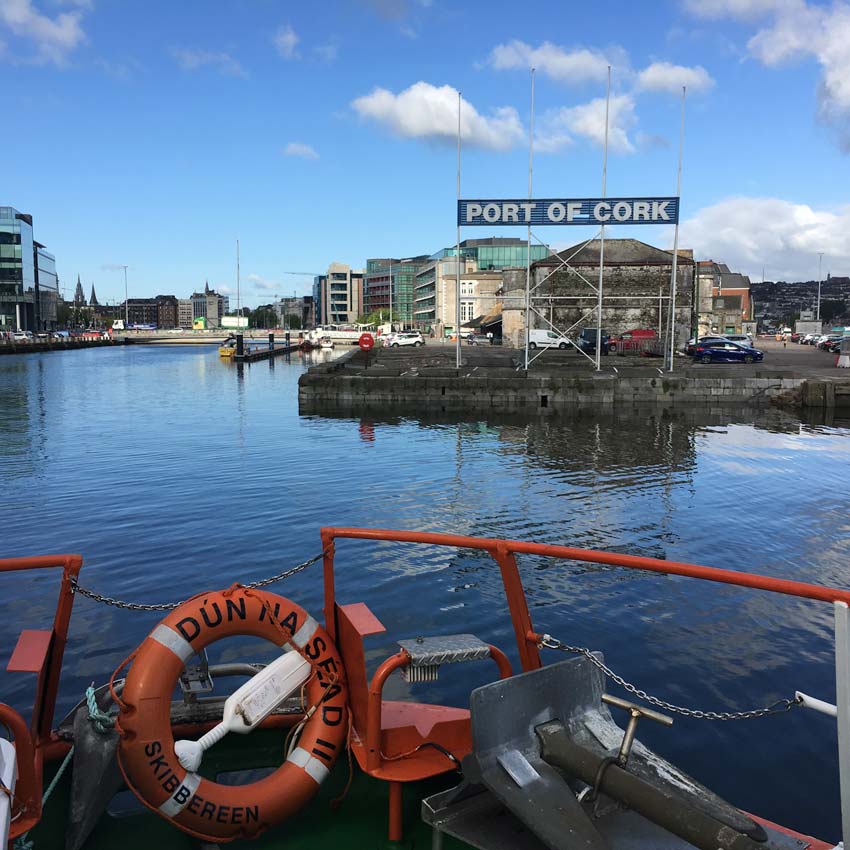
There will be a heavy security presence around the royal ‘boatercade’ with no other unapproved vessels permitted on the river during the visit.
Karen Cottrell said: “We are working very hard to make good of this significant upgrading of the ferry fleet in West Cork by promoting award-winning tours around the iconic Fastnet Rock Lighthouse.
“This is an outstanding natural and historical landmark off the West Cork coast and of course all our tours are via Cape Clear Island also known as ‘The Gateway to the Fastnet’.
“We will be delighted to welcome the royal couple and other dignitaries on board, but in reality all our passengers are special to us.
“In a few weeks’ time we will also welcome on board the chief of the O’Driscoll Clan for their annual visit to Cape Clear Island,” Cottrell added.
Medevac From Cape Clear Island For Baltimore Lifeboat
Baltimore RNLI carried out a medevac last night (Friday 7 June) from Cape Clear Island off the coast of Baltimore in West Cork.
The volunteer crew launched their all-weather lifeboat at 6.20pm, following a request from the Irish Coast Guard to provide medical assistance and evacuation to an islander living on Cape Clear.
The lifeboat arrived at North Harbour in Cape Clear within 20 minutes, and was headed back to the mainland with the casualty on board after just a two-minute turnaround.
By just after 7pm the casualty had been handed over to the care of a HSE ambulance crew in Baltimore.
Conditions at sea during the call out were good, with a north-westerly Force 4-5 wind, a one-metre sea swell and very good visibility.
Speaking following the callout, lifeboat press officer Kate Callanan said: “If you find yourself in a medical emergency whilst on an island call 999 or 112 and explain to the operator what the nature of the call is.
“The operator will then make sure that the call is directed to both the coastguard and the National Ambulance Service. We wish the casualty a full recovery.
“Our thoughts today are also with the family, friends and colleagues of the crew members of the French lifeboat service SNSM who lost their lives yesterday during a rescue.”
There were seven volunteer crew onboard the lifeboat on this callout: coxswain Kieran Cotter, mechanic Cathal Cottrell and crew members Jerry Smith, Kieran Collins, Pat Collins, Colin Rochford and David Ryan. Assisting at the boathouse in Baltimore were Gerald O’Brien, Aidan Bushe and Don O’Donovan.
The Defence Forces are currently conducting surface live firing practice shoots off West Cork, as per Marine Notice No 12 of 2019.
The practice shoots from today, Tuesday 28 May, to Thursday 30 May are taking place in Danger Area D13, in the coastal area south-south-west of Cork between Seven Heads and Galley Head and to seaward from 8am to 5pm daily.
The Danger Area comprises the sea area contained within the co-ordinates. The co-ordinates of area D13 are as follows:
| Latitude | Longitude |
|---|---|
| 51° 34.12’N | 008°42.36’W |
| 51°20.12’N | 008°34.36’W |
| 51°17.36’N | 008°48.48’W |
| 51°31.42’N | 008°57.06’W |
For the periods while the range is active, this sea area is out of bounds to all vessels. A Naval Service patrol vessel will enforce the Danger Area D13.
All vessels are advised that they are required to remain outside of the exclusion zone whilst the range is active, and are also recommended to carefully monitor the Radio Navigation Warnings that will be broadcast during the firing period.
Baltimore Lifeboat Assists In Medevac From Heir Island
Baltimore RNLI carried out a medical evacuation last night (Wednesday 22 May) from Heir Island off the coast of West Cork.
Baltimore’s volunteer lifeboat crew launched their inshore lifeboat following a request from the Irish Coast Guard at 8.34pm to provide medical assistance and evacuation to a woman on Heir Island who had sustained injuries following a fall.
The inshore lifeboat arrived at the pier on Heir Island at 8.50pm and removed the casualty to the lifeboat station 20 minutes later, where she was handed over to the care of HSE Ambulance crew.
Conditions at sea during the callout were calm with good visibility and no sea swell.
This was the first call for Baltimore’s new Atlantic 85 inshore lifeboat, Rita Daphne Smyth, since she arrived on station last September.
Speaking following the callout, Baltimore RNLI volunteer lifeboat press officer Kate Callanan said: “Baltimore lifeboat is often called upon to safely transport casualties between the islands and mainland, and our volunteer crews are trained in casualty care.
“If you find yourself in need of medical assistance, call 999 or 112 and ask for the coastguard. We wish the casualty a full recovery.”
There were four volunteer crew onboard the lifeboat: helm Jerry Smith and crew members Kieran Collins, Micheal Cottrell and Ian Lynch. Assisting at the boathouse in Baltimore were Rianne Smith, Marty O’Driscoll and Kieran Cotter.
In other lifeboat news, the outgoing chair of Clonallen Bridge Club, Warrenpoint, Maire Murray, chose the RNLI as the charity of choice for the year 2018-19.
At a recent meeting of the Clonallen Bridge Club a cheque for £500 was handed over to John Fisher, Kilkeel RNLI lifeboat operations manager by the club’s incoming president Marius McQue.
Fisher said: “As a charity we are always very thankful for all the money collected and donated to the RNLI. Giving our lifesavers the equipment they need to save lives is very expensive so be assured that the funds raised are used in the best possible way.”




























